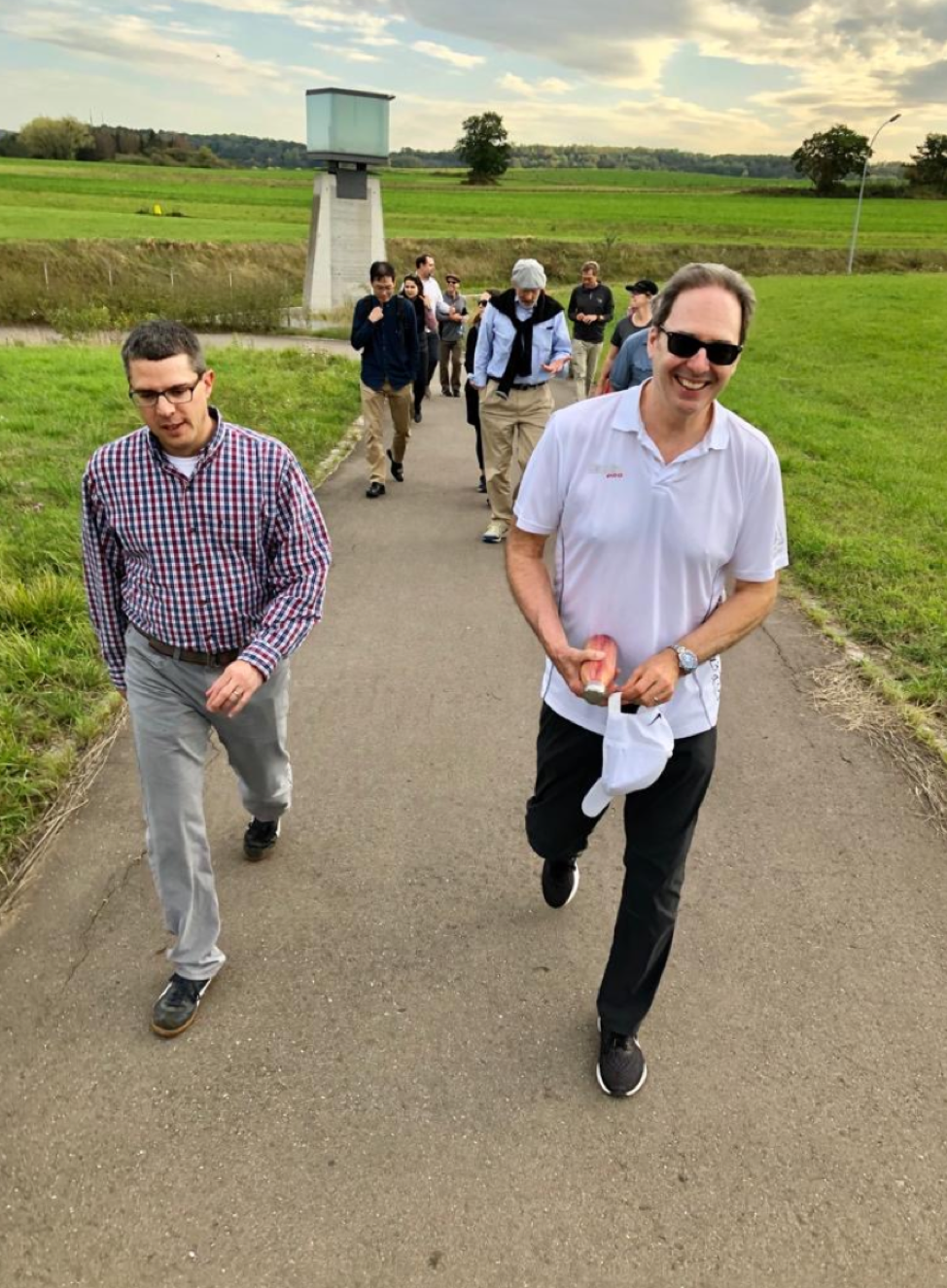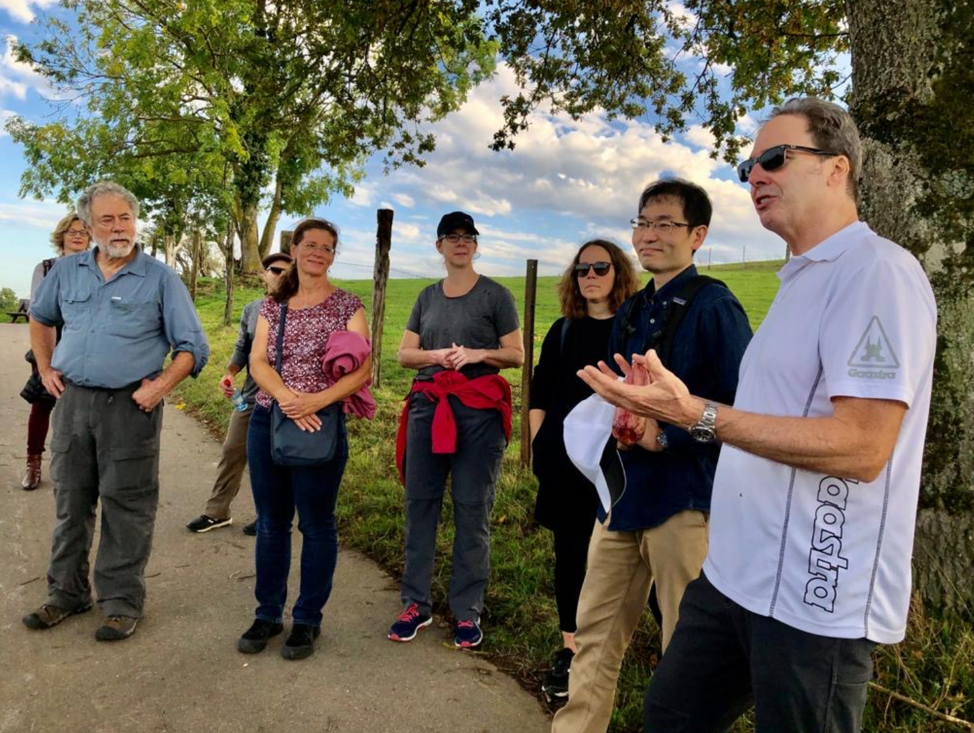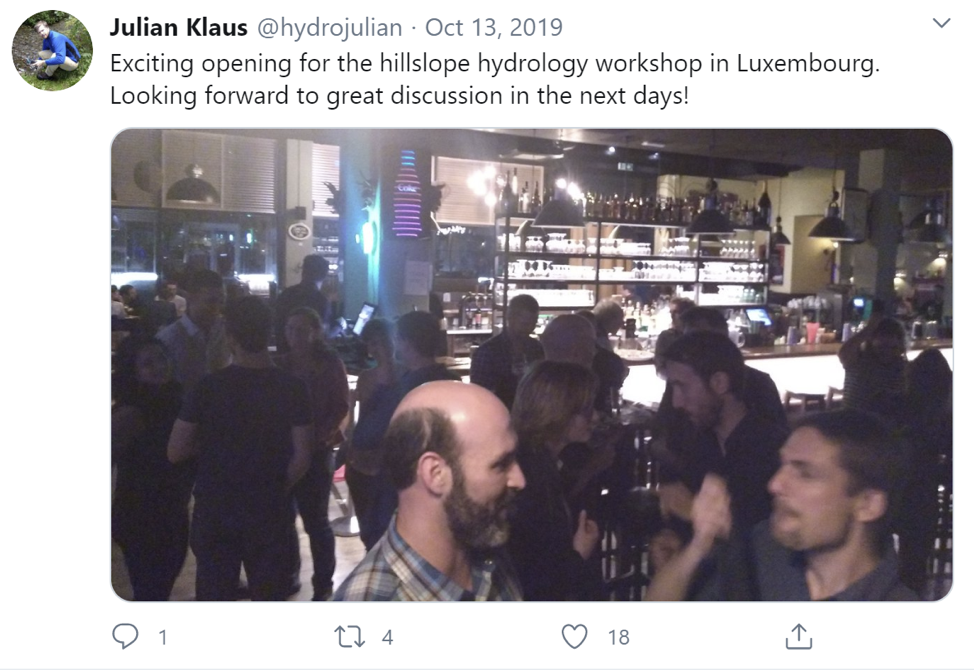
Hillslope Hydrology Past, Present & Future
Jeff turned 60! To usher in this event during Jeff's sabbatical year in Europe, a birthday Workshop called "Hillslope Hydrology Past, Present, and Future" was held Oct 13-15, 2019 a the University of Luxembourg in Belval Luxembourg
The Workshop
The workshop was co-hosted by Laurent Pfister, Luxembourg Institute of Science and Technology (LIST). Thirty five former PhD students, postdocs, and a few close colleagues gathered for the 2-day event, focused on reuniting the lab, celebrating good times and taking stock of the field of hillslope hydrology.
A sub-set of the workshop attendees took part in a pre-workshop walking tour through nearby France:

The tour of course included some field discussion (Important note: that is not gray hair you see on Jeff's head...rather, they are strands of birthday glitter):

An ice-breaker session kicked-off the meeting as chronicled by Julian:

Gordon Grant and Howard Wheater each led the singing of some customized songs during the workshop dinner:
Meeting Schedule
The two days of talks and discussions included the following:
Monday Oct 14, 2019
Main meeting room (3.540 Maison du savoir)
9.00 Welcome: Laurent Pfister and Jeff McDonnell
9.15-10.15 Workshop Lecture: Keith Beven, Hypothesis testing and model invalidation for hillslope hydrology
10.15-10.45 Coffee and pastries
10.45-12.00 Short talks: Session 1 (these will be 5 min, back-to-back talks)
Main Meeting room:
Former PhD students and Post Docs
Chair: Kevin McGuire
Scott Allen (U Utah), Fates of soil water in forests
Genevieve Ali (Guelph University), Hydrologic connectivity: Truly new concept or case of 'reinventing the wheel'
Ali Ameli (UBC), Direct quantification of the frequency and extent of hillslope hydrologic connectivity
Willemijn Appels (Lethbridge College), Irrigation indoors — using artificial hillslopes for applied research extension
Dough Burns (USGS Troy NY), A hydrological approach to trend analysis to improve understanding of ecosystem recovery
Cody Hale (Nutter and Associates), Hydrologic (Dis)Connectivity: Bridging the gap between science and practice
Nick Hjerdt (SMHI Sweden), From hillslopes to watersheds and continents (and back?) — a personal journey in hydrology
Luisa Hopp (Bayreuth University), The source and flow pathways of nitrate in an agricultural catchment: the role of groundwater and hydrological connectivity
Julian Klaus (LIST), Connectivity and mixing in the HRS continuum
Scott Jasechko, (UC Santa Barbara), Continental-scale hydraulic gradients
April James (Nipissing University), Tracing water cycling in regulated Boreal Shield watersheds using stable water isotopes in northeastern Ontario, Canada
Noon-1.00pm Group photo and lunch outside room [networking with LIST PhD students and early career researchers]
1.30-2.30 Short talks: Session 2 (these will be 5 min, back-to-back talks)
Main meeting room:
Former PhD students and Post Docs
Chair: Scott Jasechko
Richard Keim (LSU), Forest hydrology of fine-grained floodplains
Mike McHale (USGS), Rain, soils,and streams — Change in the Catskill Mountains
Kevin McGuire (Virgina Tech University), What can a hydrologist learn about soil patterns and processes?
Lyssette Muñoz Villers (UNAM Mexico City), Runoff generation in contrasting land cover catchments: Lessons from a tropical montane cloud forest environment in Mexico
Magali Nehemy (University of Saskatchewan), Insights into plant water use from a controlled lysimeter experiment
Natalie Orlowski (Freiburg University), TBA
Luke Pangle (Georgia State University), An urban context for hillslope and headwater catchment hydrology
Leo Peskett (University of Edinburgh), Does spatial organization of vegetation on hillslopes matter?
Taka Sayama (Kyoto University), Groundwater dynamics in humid tropical hillslopes: Toward right impact assessment of landcover and climate changes on catchment hydrology
Jan Seibert (Univeristy of Zurich), Hillslope hydrology in Swederland — runoff generation in Switzerland from Swedish perspective
Ilja van Meerveld (University of Zurich), Effects of hillslope aging, soil and vegetation development on near surface flow pathways
Markus Weiler (Freiburg University), On the pain of losing tennis matches to Jeff but the joy of skiing him into the ground on steep hillslopes
2.30-3.45 Breakout group discussion 1 (Chaired by Ilja van Meerveld):
First few minutes in Main meeting room:
Then, reserved discussion rooms in Library
"What do we know; what do we think we know. The goal of this discussion: what we deem essential to communicate to modellers"
Workshop participants will break into 4 groups—this part for workshop speakers only
3.45-4 Coffee and pastries
Main meeting room:
4-4.30 Reports back by the 4 groups (5-min each) and the Large Group discussion
5.00 Exercise and relaxation time
7.00 Workshop Dinner for Invited Participants, The Seven Hotel. Dinner, toast, humorous anecdotes from the past 30 years, embarrassing stories (but not too embarrassing), songs.
Tuesday Oct 15, 2019
Main meeting room (3.540 Maison du savoir)
9.00 Welcome re-cap, Jeff McDonnell
9.15-10.30 Short talks Session 3 (these will be 5 min, back-to-back talks)
Old Friends (a few older than me, even!) session:
Chair: April James
Paolo Benettin (EPFL), TBA
Fabrizio Fenicia (EAWAG), How can experimentalists contribute in building large scale models
Gordon Grant (US Forest Service), TBA
Rick Hooper (Tufts University), Using geofabrics to synthesize catchment processes to landscape scale
Daniele Penna (Univeristy of Florence), TBA
Laurent Pfister (LIST), From diatoms to the moon: on the benefit and limitations of interdisciplinary work in hydrology
Chris Soulsby (University of Aberdeen), Water storage-flux-age interactions in the extreme hillslopes: moving on from humid temperate catchments
Doerthe Tetzlaff (IGB and Humboldt University), Ecohydrological controls on hillslope connectivity in drought-sensitive mixed land use catchments
Howard Wheater (University of Saskatchewan), Water security and why hillslopes still matter
10.30-11 Coffee and pastries
11.-12.00 Breakout discussion 2 (Chaired by Jan Seibert)
"What don't we know? What are the most important and fundamental questions we have in hillslope hydrolgy—this session is simply to list and discuss as many as possible."
12-12.3 Reports back and large group discussion
12.3-2 Lunch (on own at area restaurants)
2.00-3.00 Breakout Session 3 (Chaired by Markus Weiler)
First few Minutes in Main meeting room:
Then, reserved discussion rooms in Library
Hillslope Hydrology's ~10 most important unanswered questions (motivated by the IAHS 23 Unanswered Questions activity). Pare down and rank the final questions in preparation for the commentary.
2.45pm Coffee and pastries
3-3.30 Reports back and large group discussion in main meeting room
3.30-4.00 Wrap-up discussion, next step plans for commentary, close [McDonnell]
4.00 Adjourn
